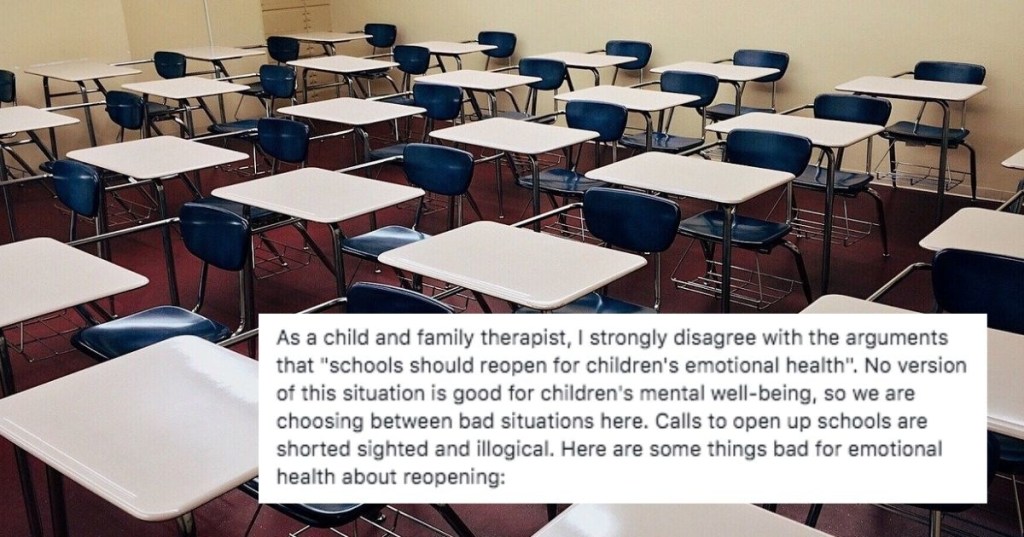As the U.S. grapples with record-setting daily counts of coronavirus cases, people are debating the wisdom of sending kids back to school for the upcoming school year. The Trump administration has made it clear that they want schools fully open and running in person, even threatening to withhold federal funding from schools that refuse. Teachers, parents, and school administrators are grappling with what that might look like and whether the idea of putting dozens of kids and adults together in an indoor space for six or seven hours a day during a pandemic is as asinine on its face as it sounds.
One of the many arguments in favor of kids going back to school is that kids need the normalcy of school and peer interaction in order to stay mentally and emotionally healthy. But not everyone is in agreement with that assessment, including a child and family therapist who shared an explanation of how kids going to school in a pandemic is not only unwise from a public health standpoint, but from a mental health standpoint as well.
A post shared by Jodi Kelber on Facebook comes from an unnamed child and family therapist in Maryland, and starts with, “A therapist’s perspective has been absent regarding children’s mental health in the debate to open schools or not.”
The post reads:
“As a child and family therapist, I strongly disagree with the arguments that ‘schools should reopen for children’s emotional health’. No version of this situation is good for children’s mental well-being, so we are choosing between bad situations here. Calls to open up schools are shorted sighted and illogical. Here are some things bad for emotional health about reopening:
– Children experiencing so much more death of their loved ones, friend’s loved ones, and community members.
– Having to obey rigid and developmentally inappropriate behavioral expectations to maintain social distancing for hours at a time.
– Restricting their engagement with their peers even though those peers are right in front of them.
– Having to constantly actively participate in cleaning rituals that keep their community trauma present with them
– Somehow having to have the executive functioning within all of this to meet educational standards and possibly experiencing overwhelm, shame, and self-doubt when they reasonably can’t
– Being unable to receive age appropriate comfort from teachers and staff when dysregulated from all of this, thereby experiencing attachment injuries daily.
– Lack of any predictability as COVID takes staff members for weeks at a time with no warning while children wonder if that staff will die as well as the looming threat of going to back into quarantine any random day
Returning to school as things are now is NOT better for children’s mental health.
It is a complete rationalization by people who are uncomfortable with children not engaging in productivity culture.
The majority of schooling NEEDS to stay virtual to protect our children and teachers and to make room for the safe return of the populations of students who actually do need to be in person.”
One of the hallmarks of this pandemic is being stuck between a rock and a hard place in practically every arena of normal life. If we shut down, the economy tanks, workers can’t work, and people suffer. If we don’t shut down, infectious disease spreads like wildfire, masses get sick and die, and people suffer. Same idea with schools, especially when many working parents rely on schools for childcare. (It’s worth nothing that had we adequately shut down early enough and long enough, we arguably wouldn’t be in the terrible predicament we’re in now with schools reopening).
There simply are no good answers, which is a hard reality to deal with. But if we have to choose between kids and families struggling while preventing pandemic spread or kids and families struggling while actually contributing to pandemic spread, it makes more sense to choose the former. Yes, keeping kids out of school sucks is problematic in a bunch of different ways, but so is sending kids to school. Deciding that “it’s not that bad” (which it is) or “kids don’t really spread it” (which we don’t know) or “we just have to live with it” (which renders all of the sacrifices we’ve made up to now worthless) is magical thinking that will result in greater illness, suffering and death than we’re even seeing currently. While the question remains, “What about parents who can’t stay home with their kids?” we simply have not controlled our outbreak to a level where sending all kids back to school is a reasonable option.



































